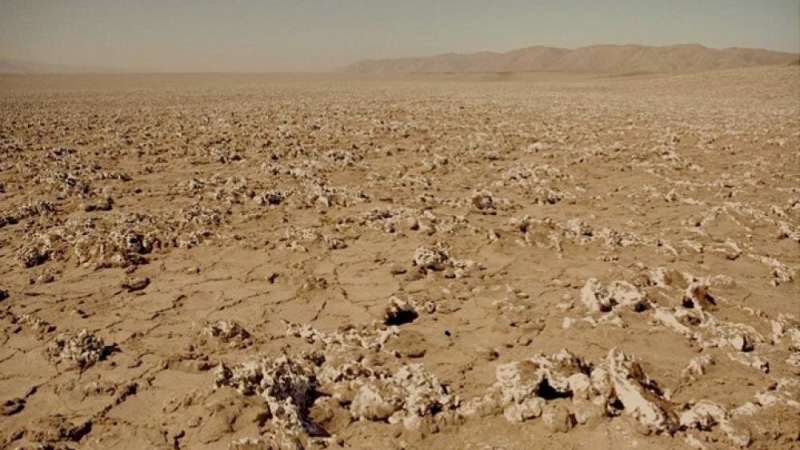Study examines what microorganisms on Mars would need to survive

No life has yet been found on Mars, but it is exciting to explore the circumstances under which it might be possible. A team led by the Technical University of Berlin (TU Berlin) with the Leibniz Institute of Freshwater Ecology and Inland Fisheries (IGB) has studied the cellular processes that regulate the adaptation of microorganisms to perchlorates. If microorganisms could genetically adapt their stress response to this salt, which occurs in some deserts and on Mars, their survival on the Red Planet might be possible.
The team's paper describing their study is published in the journal Environmental Microbiology.
Life as we know it requires energy and the availability of CHNOPS. This acronym stands for carbon, hydrogen, nitrogen, oxygen, phosphorus and sulfur. Trace elements and liquid water are also indispensable. Much of this is available on Mars: Energy can be provided by sunlight or chemical processes, carbon is available through the thin but carbon dioxide-rich atmosphere, and other essential elements are abundant on the planet's surface in what is called regolith.
However, liquid water is a challenge due to the low atmospheric pressure of about 6 millibars (for comparison, the average air pressure on Earth is about 1 bar) and average temperatures below freezing. One of the few ways to produce water near the surface of Mars is to form temporarily stable salt solutions through deliquescence.
In this process, a salt absorbs water from the atmosphere and dissolves in it. There are many hygroscopic salts on Mars, including perchlorates (ClO4-), which easily absorb water from the atmosphere and lower the freezing point of water. They also occur occasionally on Earth in very dry deserts.
This water is theoretically sufficient to sustain the metabolism of certain groups of microorganisms. However, perchlorates trigger stress in the cell, and in what way was little known until now.
"In order to understand potential microbial life on Mars, it is important to find out how microorganisms deal with such stressors, because only if they develop a good stress response can the microbes cope with the high salt concentrations and really take advantage of the salts such as deliquescence and lowering of the freezing point," said first author Jacob Heinz of TU Berlin.
The research team used a proteomics protocol developed by the Robert Koch Institute (RKI) to analyze the perchlorate-specific stress response of the yeast Debaryomyces hansenii and compared it with commonly known adaptations to salt stress.
The researchers found that the stress responses to sodium chloride and sodium perchlorate share many common metabolic features; for example, the same signaling pathways, increased energy metabolism or the formation of osmolytes.
"However, we also identified several new stress responses that were specific to perchlorate. For example, glycosylation of proteins and remodeling of the cell wall, presumably to stabilize protein structures and the cell membrane. These stress reactions would also be of great importance for presumed life on Mars," explained co-author Hans-Peter Grossart from IGB.
"If we are looking for life on Mars, we have to be open-minded, because indigenous Martian microbes—if they exist—are certainly adapted to the environmental conditions on Mars by different biochemical processes that may not occur on Earth," said Dirk Schulze-Makuch, co-author of the study and scientist at IGB and TU Berlin. "But if we investigate how organisms on Earth deal with the stress factors on Mars, such as perchlorates, we will have the first clues on how life on Mars could cope with the difficult environmental conditions."
More information: Jacob Heinz et al, Perchlorate‐specific proteomic stress responses of Debaryomyces hansenii could enable microbial survival in Martian brines, Environmental Microbiology (2022). DOI: 10.1111/1462-2920.16152
Journal information: Environmental Microbiology
Provided by Forschungsverbund Berlin e.V. (FVB)





















